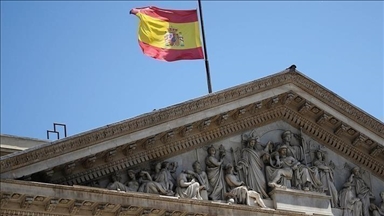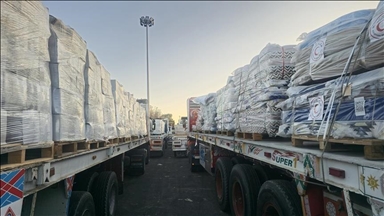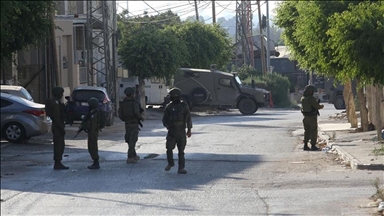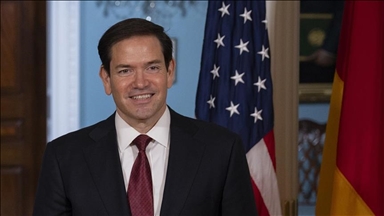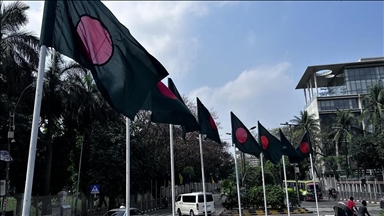‘Slow-motion ethnic cleansing:’ After Gaza ceasefire, Israeli escalation shifts to West Bank
Following Gaza ceasefire, Israel turns military and political focus to occupied West Bank
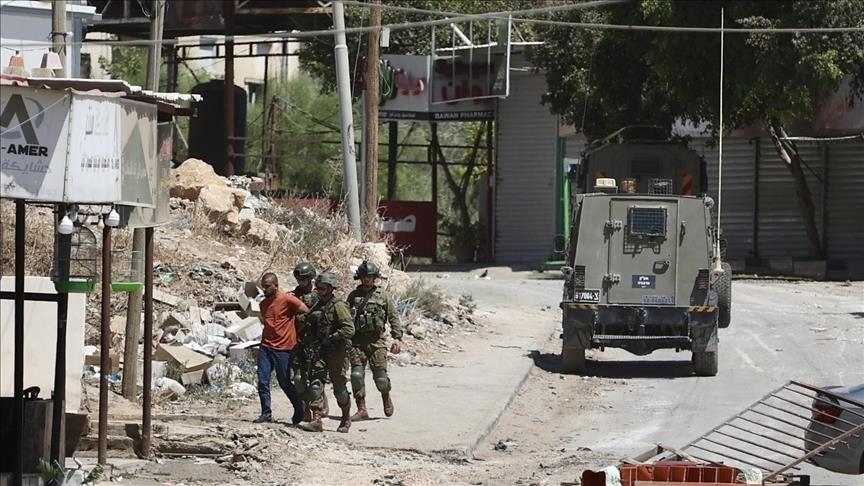
- Israeli government is pursuing 2 parallel paths of escalation in West Bank – one led by settlers and the other by Israeli army, says Ramallah-based analyst Mohamad Alqeeq
ISTANBUL
Following the Gaza ceasefire, Israel has turned its military and political focus toward the occupied West Bank, escalating actions that analysts say amount to ethnic cleansing of Palestinians and the dismantling of future Palestinian statehood.
On Wednesday, the Israeli Knesset passed a bill in its preliminary reading to annex the occupied West Bank, as Israeli forces and settlers intensify operations across the territory, including raids, arrests, demolitions, and settlement expansion.
“The Israeli government has decided to expand its territories in the West Bank by annexing the territories there to get rid of Palestinian sovereignty and to show the international community that there is no way to give the Palestinians a state,” Mohamad Alqeeq, a political analyst based in Ramallah, told Anadolu.
According to him, the Israeli government is pursuing two parallel paths of escalation in the West Bank – one led by settlers and the other by the Israeli army.
“Israel settlers are carrying out attacks against Palestinians and their properties, vandalizing agricultural crops, burning homes and cars. The Israeli government protects settlers during these attacks by invading Palestinian areas, and arresting anyone who stands up to them.”
Alqeeq said Israel is increasing pressure on Palestinians to leave their land, water springs, and pasture areas to make way for a settler state.
“The second path is by the Israeli army, which is conducting many military operations in the heart of the cities with soldiers inside Ramallah, Nablus, Jenin, Hebron to disrupt the daily life of the Palestinians, and to push them to think about the day after.”
Surge in arrests, detentions, and settler violence
Since the Oct. 10 ceasefire in Gaza, the West Bank has witnessed a surge in Israeli raids, including arrests, shootings, and property destruction.
Last week, Israeli army forces reportedly detained 35 Palestinians across the occupied West Bank, while also carrying out demolitions with at least 70 houses facing such risk.
Illegal Israeli settlers have carried out 7,154 assaults on Palestinians and their properties over the past two years, resulting in 34 deaths, according to rights groups.
Since Oct. 7, 2023, more than 1,056 Palestinians have been killed in Israeli attacks in the West Bank, with over 20,000 others detained, Palestinian figures show.
For Taghreed El-Khodary, a former visiting scholar in the Middle East Program at the Carnegie Endowment, Israel's policy in the West Bank related to ethnic cleansing is different from what they did in Gaza.
“In the West Bank, they are doing a slow-motion ethnic cleansing,” she said.
Bid to legalize annexation
El-Khodary highlighted that there has long been de facto annexation in the West Bank, and that Israel is now trying to legalize it.
“If you go to the West Bank, it's unbelievable what they have been doing for many years since the Oslo (Accords) years. They are daring to divide villages, cities and people cannot go from one place to another place. The movement is becoming extremely hard for Palestinians in Area A.”
Under the 1995 Oslo II Accord, the West Bank was divided into three areas, with Area A placed under full Palestinian control.
Alqeeq said that with the Israeli army "exhausted" following the Gaza war, the focus has now shifted to the West Bank.
Rising provocations in East Jerusalem
Experts have also pointed to heightened provocations in occupied East Jerusalem, after far-right Israeli Minister Itamar Ben-Gvir stormed the Al-Aqsa Mosque compound twice last week.
Also, the Israeli Knesset on Wednesday passed a bill to annex the Ma’ale Adumim settlement built on Palestinian land east of Jerusalem.
According to Alqeeq, Palestinians from the West Bank and Gaza have been barred from praying at Al-Aqsa, while Israeli authorities continue restricting building permits and demolishing Palestinian homes.
“Ben-Gvir and Smotrich have accelerated their steps to vanish the presence of the Palestinians inside Jerusalem by expelling many people and putting restrictions,” he added.
Alqeeq highlighted the Jordanian guardianship and the role of the Palestinian Authority at the mosque, warning that Israeli provocations could spark further regional unrest.
He said: “All these policies from Ben Gvir and the Israeli government indicate a new treatment from Israel against Al Aqsa Mosque to pave the way for their huge plan to build the temple.
“That will be the spark … that will put more pressure and will not spare the region from further confrontations and instability.”
Ceasefire under threat
Experts warn that escalating violence in the West Bank could jeopardize the fragile Gaza ceasefire.
El-Khodary said the situation risks undermining the ceasefire, as neither Prime Minister Benjamin Netanyahu nor his coalition has a political interest in maintaining it.
“Netanyahu will keep using the excuse of his coalition. Then you have Israeli elections and you have an Israeli society that is most of it in support of genocide. So he will always do his best to disrupt that ceasefire because it's not to his advantage, politically speaking.”
She noted that Washington appears keen for the ceasefire to hold, as US special envoy to the Middle East Steve Witkoff, Vice President JD Vance, and others visited Israel this week.
On Wednesday, US Secretary of State Marco Rubio warned that Israel was “threatening” the Gaza ceasefire deal proposed by Trump through its new annexation bill.
2-state solution is at risk
Analysts say annexing the West Bank would end the prospect of a two-state solution as envisioned by UN resolutions.
For Alqeeq, Israel’s intentions are clear.
“After the Oslo Accords that Israel signed in 1993, they (Israel) isolated the Gaza Strip from the West Bank. In 2002, they isolated Jerusalem from the West Bank by installing the apartheid wall.”
Commenting on the E1 settlement project, which includes 3,400 housing units and is seen as a gateway to annexation, Alqeeq said: “Now with the E1 project, Israel has approved to divide the West Bank into two parts, to isolate the Palestinians in their cities.”
Isolation and international backlash
The Knesset annexation bill has drawn international backlash, with Türkiye, Saudi Arabia, Egypt, and Qatar among those rejecting the move.
The vote came despite opposition from Trump, who said on Thursday that Israel “is not going to do anything” with the West Bank.
El-Khodary said European officials have issued stern warnings to Israel over its declared annexation plans.
“There should be a call of boycott, when it comes to arms, when it comes to trade, and I think that's what we are moving towards. If they are violating international law, the EU must put pressure on Israel.”
Anadolu Agency website contains only a portion of the news stories offered to subscribers in the AA News Broadcasting System (HAS), and in summarized form. Please contact us for subscription options.


